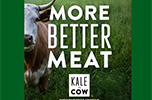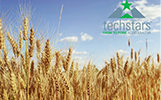| Global Livestock Game at Tipping Point
Shan Goodwin, North Queensland Register | December 20, 2017
"Few sectors are growing at the rate of livestock in developing countries.
"Few give us so many opportunities to do so much good on so many fronts as the livestock sector in developing countries. We must not waste this unparalleled opportunity to make livestock an equitable, safe and sustainable sector for the coming generations."
The developing–country tropics have much to learn from Australia's livestock technologies and management practices and policies.
There is no shortage of people willing to promote plant based food over meat, and we all understand the importance of getting sufficient protein, energy and other nutrients from a varied diet. I would add that while this means that some of us eat too much meat, there are many more in the world who don't have access to enough animal protein.
Many 'experts' will tell you that it is better for the environment to grow more crops because they have a lower carbon footprint, ignoring the fact that cultivating land depletes soil carbon rather than increasing it, and forgetting that converting grasslands to crops also negatively impacts biodiversity. Just because a piece of land can produce crops, does not mean that it is a "better" use of the land.
Enteric methane emissions are often cited as a major contributor to climate change, and methane is a potent GHG although a short term one as it breaks down in 10–12 years. While we can reduce methane emissions from cattle, and we know that diet and rumen treatments can achieve this, we should also recognise that sources of atmospheric CH4 are many and varied, and include significant contributions from the fossil fuel industry.
Compare that to ploughing grassland to convert it to crops – this immediately releases soil carbon in the form of CO2 and methane. To put the impact of these soil C emissions in perspective, they account for around 1/3 of the cumulative total of anthropogenic emissions. The key to getting Carbon back into soils lies in appropriate management of grazing ruminants, and not in converting more land to crops.
'Kale vs. Cow' Documentary Makes a Case for Meat
Kimberlie Clyma, Meat & Poultry | December 20, 2017
At a time when plant–based foods are popping up on menus around the country and the meat industry is being constantly scrutinized, Diana Rodgers, RD, is on a mission to make a case for meat. The "real food" nutritionist, podcast and blog author of Sustainable Dish and sustainability advocate is developing a documentary film called "Kale vs. Cow: The Case for Better Meat" that aims to examine the ethical, environmental and nutritional conundrums of eating meat.
"'Kale vs. Cow' probes the fundamental moral, environmental and nutritional quandaries we face in raising and eating animals. In the film, we focus our lens on the largest and perhaps most maligned of farmed animals, the cow," according to the film's website. To find out more about the film, "Kale vs. Cow," click HERE.
PDPW Policy Summit Tackles Climate Change, Livestock Biotech
Jan Shepel, Wisconsin State Farmer | December 27, 2017
Dr. Frank Mitloehner, a professor specializing in air quality at the University of California–Davis spoke with the group via an internet connection from Germany, having had to travel there for a family emergency. For years he has pushed back against animal activists who try to blame animal agriculture for a lion's share of the world's contributions to greenhouse gas emissions – those gases that contribute to climate change.
He noted that these activists argue that emissions from cows, pigs, sheep and chickens are comparable to all transportation sectors – including cars, trucks, airplanes and trains – and suggest that limiting meat consumption will help reduce these emissions and their contributions to climate change. In California, he said, "hardly a day goes by" when dairy production isn't linked to global warming.
Cargill Works to Find Food Sustainability, Security with Two Tech Start–Ups 
Holly Demaree, World Grain | December 19, 2017
Cargill is partnering with Techstars and Ecolab to create the Techstars Farm to Fork Accelerator with a goal of safer, more secure and sustainable food supply. It will launch in Minneapolis, Minnesota, U.S., in 2018.
"We are thrilled to welcome some of the brightest minds in food and ag tech into Cargill and Ecolab's backyards," said Justin Kershaw, chief information officer (CIO) at Cargill. "This Accelerator allows us to invest our time and resources in technology shaping the future of agriculture, and to address some of the greatest challenges facing the food system. At the same time, we see the partnership with Techstars as a way to inject start–up energy inside Cargill, where we are committed to creating a culture that fosters technology innovation through internal expertise and external partnerships."
Less Water Needed to Produce Beef Today 
Lorraine Stevenson, Manitoba Co–operator | December 28, 2017
The study looked at a time period between 1891 and 2011. These newest results reveal a 17 per cent decrease in the amount of water now needed to produce that same one kilogram of beef than 30 years ago.
The improvements come from efficiency gains in feed production, how cattle are raised and from more beef now produced per animal, researchers say.
The research contributes to the efforts of the Canadian Roundtable for Sustainable Beef (CRSB), including the CRSB's National Beef Sustainability Assessment.
"Water is a precious resource and Canadian beef producers are committed to supporting responsible water use across our production systems," said Bryan Thiessen, manager of Namaka Farms near Strathmore, Alberta and chair of the Beef Cattle Research Council (BCRC).
A Green Marketing "Wild West": Greenwashing in the Beef Sector
Jonathan Gelbard, Ph.D, Triple Pundit | December 14, 2017
As a grassland scientist and sustainable business advisor, I've been working for years to help define sustainable beef production and develop incentives for ranchers, farmers and other supply chain stakeholders. What I've learned during this journey is that while there are exciting advances occurring in the beef sector, sustainability marketing is a Wild West of (mostly unintentional) greenwash.
The language on beef retailer and producer websites often features vague, unsubstantiated sustainability–related claims. This results in confusion about what these claims mean in terms of measurable, verifiable benefits for the health of ecosystems, people, and livestock. | |
